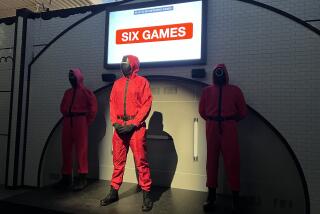When 2 Worlds Meet
- Share via
Tiffany Haag has a real-life husband and an online husband.
Her flesh-and-blood partner is a slender 29-year-old computer programmer with brown hair, while her digital spouse is a swarthy warrior of the woods named Nitewolfe.
The three met for the first time in a hotel lobby near the San Diego airport and the trio did their best to act normally, chatting jovially as planes roared overhead.
For the most part, they made this unconventional meeting appear as natural as springtime. That’s because it took place at a convention for players of “EverQuest,” an online role-playing game in which players temporarily escape their mundane existence for a virtual world full of dragons and danger.
Face-to-face meetings of online comrades have become an increasingly common rite of passage among players who develop friendships and even love affairs in virtual lives that sometimes are richer than their real lives.
So popular are these meetings that they’ve given rise to a cottage industry organizing them for the hundreds of thousands of players who have extended part of their lives to the sprawling realms of online games such as “EverQuest,” “Asheron’s Call” and “Ultima Online.”
As engaging as these worlds might be, however, some players seek a true melding of reality and fantasy. The results run the gamut from pleasant surprise to bone-jarring shock, leading to some of the most contorted emotional adjustments and awkward introductions since the days of arranged marriages.
Often, online characters bear no resemblance to the physical appearance or personalities of the humans who create them. Someone who plays an angry, bloodthirsty ogre might actually be a shy engineer. A seventh-grader could become a swashbuckling warrior. Haag’s online husband is played by a burly, mustachioed information systems manager.
“He looks nothing like his character,” said Haag, a software engineer from Fort Collins, Colo. “It’s weird meeting. Online, you can have any personality you want. It’s kind of scary. You wonder what people will be like when you meet them for real. It can really change your online relationship a lot.”
Haag said she was not surprised by the encounter because they had exchanged pictures and talked on the phone beforehand. She was, however, shocked to meet her “game master,” a Sony employee whose online character assists players with technical problems.
“Our game master is a giant troll, but in real life he’s this really nice guy,” Haag said, pointing to Keith Rekoske, a slight man cradling his newborn baby.
Of the 1,200 players who attended the weekend confab, most had never met, even though they might have spent months together online, watching each other’s backs, slaying monsters, sharing loot and even marrying. The result was a strange amalgamation of intimacy and awkwardness as people who had never physically laid eyes on each other hailed each other as long lost friends.
High-fives and bear hugs are rampant amid deafening chatter. Eyes dart from name tag to name tag. Few know who they’re looking for by sight. It’s the character name that’s relevant.
Cindy Archuletta, a Sony employee who began organizing EverQuest “Fan Faires” a year ago, described her meeting several months ago with a fellow player.
“It was like seeing an old friend,” she said. “We immediately hugged. It just seemed like the most natural thing in the world. People obviously don’t look like their characters, but their personalities show through. When someone’s kind and friendly online, chances are that’s how they are in real life.”
But the meetings could also go awry, creating surprises or even dashed expectations.
“I have friends who met through the game and have gotten married,” Archuletta said. “But I also had a friend who met this guy from Sweden. They were perfect together online. So he flew out for a week, and we met in Las Vegas. The instant they met, they hated each other.”
Stoking players’ expectations are the appearances of the avatars, the online embodiments of characters. Female characters are buxom, young and impossibly thin. Many start out scantily clad and acquire additional clothing and armor along the way. Many male characters have exaggerated features--bushy beards, bulging muscles and an ageless quality.
“A lot of people said they were surprised at how I looked,” said Shane Summers, a 6-foot-3, 230-pound salesman from Fort Worth. “My character is a small, light wood elf. He’s just this little guy.”
For Summers and thousands of other “EverQuest” fans, such games allow them to role-play and socialize across vast geographies. The role-playing tradition started in the 1970s and 1980s with paper-and-pencil games such as “Dungeons and Dragons.”
With the Internet came games played over multi-user domains, or MUDs, which drew players from all over the planet. And as computers became speedier and more powerful, text-based MUD games turned into games based on a virtual world rendered with three-dimensional graphics.
Today, more than 1 million people play online “persistent world” games such as “EverQuest,” made by Sony Online Entertainment; “Ultima Online,” produced by Electronic Arts Inc.; and “Asheron’s Call,” by Microsoft Corp.
“EverQuest,” which was launched two years ago, has 360,000 subscribers who have purchased a CD-ROM of the game and pay $9.89 a month to play. The average subscriber spends 20 hours a week playing “EverQuest.” It is so addictive, players have taken to calling it “EverCrack” in an allusion to crack cocaine.
One of the things that make “EverQuest” addictive is its social aspects. Gamers form alliances within the game, band together to hunt, schedule times to gather and chat or explore. In the process, romances and friendships bloom.
Then comes the urge to meet.
Douglas Thomas, associate professor at the University of California’s Annenberg School of Communications in Los Angeles, believes that technology has long caused people who wouldn’t otherwise meet to form relationships.
“The telegraph exhibited some of the same phenomenon we’re seeing with the Internet,” Thomas said. “There were chat groups. People developed relationships with the operators. Romances blossomed through Morse code. We think this is new and fresh. In fact, it’s been repeated with every new communication technology.”
What drives these relationships is a fundamental urge to socialize.
“It’s not a substitute for face-to-face communication,” said Henry Jenkins, a professor at the Massachusetts Institute of Technology. “It actually reinforces it. Once you’re in the game and have established a community, the impulse is to gather.”
Many players say the game is a social equalizer, a place where young and old, rich and poor can interact without prejudice, and where physical appearances aren’t barriers--unless players meet.
Thomas O’Dell, a devotee of role-playing games, described a meeting he had with a fellow player, whose character was glib and sociable.
“He couldn’t talk about anything except ‘EverQuest,’ ” said O’Dell, a San Francisco software executive. “He was just strange.”
That wasn’t the case with Tiffany Haag and her online husband, who would give only his first name--Matt--and goes by his online character’s name, Nitewolfe.
Their relationship started when a mutual online acquaintance suggested that Tiffany’s character ask out Nitewolfe. The two met online and chatted. They killed evil beasts. They went on epic adventures. Weeks later, their online marriage took place on a remote island in “EverQuest.”
Bret Haag, Tiffany Haag’s husband, seemed at ease with it. “I thought it was weird at first because it was kind of out of my control,” he said. “But it really doesn’t bother me. He’s a nice guy.”
*
Times staff writer Alex Pham covers the video game industry.
More to Read
The biggest entertainment stories
Get our big stories about Hollywood, film, television, music, arts, culture and more right in your inbox as soon as they publish.
You may occasionally receive promotional content from the Los Angeles Times.










